- Home
- Lauren Oliver
The Shrunken Head Page 6
The Shrunken Head Read online
Page 6
The door to Anderson’s Delights was locked. Sam reached up and knocked carefully. Paint flaked off at his touch, and a crack appeared in the wood. He winced.
“Sorry,” he said.
“It’s not your fault,” Pippa lied.
They waited. Thomas shifted anxiously from foot to foot, tugging his hair, until it was standing straight up from his scalp. He never could stand still. Silence: no sound of footsteps, no murmur of voices. With each passing second, the light was draining from the sky. Pippa knew that meant curfew at the museum was rapidly approaching.
“Well,” Max said. “That’s that. No one’s home. Too bad and try again tomorrow.”
“Wait,” Sam said softly. “The light’s on upstairs. Look.”
He was right: above them, on the third floor, a light was glowing softly in the window. And it was flickering slightly, as though someone upstairs was passing in front of a lamp, walking back and forth in agitation.
By silent agreement, Pippa, Max, and Sam all turned to look at Thomas. Thomas sighed.
“All right, all right,” he grumbled. “I’m going.” In an instant, he was shimmying up a drainpipe—quickly, practically silent, except for the occasional squeak of his shoes or rattle of the metal pipe. Soon he became a small black shadow against the deepening twilight. And then, in less than a minute, he had reached the upstairs windows.
“What do you see?” Pippa called out softly.
“Nothing,” he called down. “Curtains are drawn. Give me a second.”
Like a spider, he flung himself from the drainpipe onto the narrow window ledge. Pippa gasped and unconsciously cried out as he teetered there for a second, windmilling his arms. But Thomas didn’t fall. He found his balance; dropped into a crouch; and, after fiddling with the latch, slid open the window and eased himself inside.
They waited in anxious silence for one, two, three seconds. Pippa expected at any second to hear an explosion of shouting, but there was nothing. Then Thomas’s head reappeared at the window.
“Come quickly!” he shouted. “Upstairs! Now! Hurry!”
Sam didn’t even hesitate. He drove a fist into the front door; with a tremendous boom it collapsed inward. Sam stepped aside and gestured politely for Max and Pippa to go before him.
“Thank you,” Pippa said, and passed into the shop.
The hall was carpeted and smelled like mildew and cat urine. To their right was a dusty glass door that obviously led to the shop; on it the words Anderson’s Delights had once been painted, but after several decades, only the letters And on Deli remained. A large sign that said CLOSED hung on the knob.
Directly down the hall was a narrow wooden staircase. Pippa raced toward it, and Max practically elbowed her out of the way.
“Move it,” she said.
Just as they had reached the second floor, Thomas appeared on the third-floor landing.
“Hurry!” he shouted again. His eyes were practically bulging out of his head. A door was open behind him, and Pippa caught a glimpse of dark green wallpaper and a ceiling crisscrossed with rough wooden beams.
“We’re coming—as—fast—as—we—can!” Pippa panted.
Max reached the third floor first. Pippa and Sam were right on her heels.
“This way.” Thomas’s face was stark white, as though someone had drained him of all his blood.
Together they piled through the open doorway, which led to Mr. Anderson’s private chambers. There was a fire burning cheerfully in the grate, and several lamps were illuminated. The room reminded him immediately of the museum. Every surface was cluttered with objects: a stuffed rearing king cobra, its fangs bared and hood extended; a carved African mask; a rusted saxophone. A mug of tea sat on a large mahogany desk, and a book was lying open on a squashy armchair.
And there was a body hanging from the rafters.
Pippa screamed. Sam shouted. And Max threw her knife. Quick as a flash, the blade whizzed through the air and severed the rope, slicing the body down from where it dangled.
The children ran to him at once. His face was the bruised purple of a storm cloud. A rope was knotted tightly around his fleshy neck. He was wearing an old pinstripe suit and a pair of patched leather shoes, and they knew at once they were staring down at the face of Mr. Anderson.
Sam kneeled beside him. Pippa hugged herself. She was suddenly freezing. For a minute, no one said a word.
“Is he . . . ?” Max asked finally.
Sam looked up at her. His dark eyes were hollows in his face. “Dead,” he confirmed.
Max had claimed earlier that she’d known a lot of dead people. That was true. But she’d never seen one. It was not at all how she’d imagined it would be, not at all how people spoke about saying good-bye to their dead grandmothers or described attending the funeral of a beloved neighbor. “She looked so peaceful!” they would say, dabbing their dry eyes with a handkerchief. Or: “He looked just like he was sleeping.”
Mr. Anderson didn’t look peaceful, and he certainly didn’t look like he was sleeping. And Max did not feel curious, or even superior, as she had imagined she might, standing above a dead person when she was still alive.
She just felt sad and a little sick.
It wasn’t until Sam put a hand lightly on her shoulder that Max realized she’d been frozen there, staring, for who knows how long. Pippa was watching the street from the window; Thomas was gone.
“Are you all right?” Sam asked.
“Fine,” Max said quickly. She winced and shrugged him off, both because she had let her guard drop and because Sam’s touch, even when he was doing his best to be careful, was a little like the gentle pressure of a thousand-pound boulder.
“They’re coming,” Pippa said, turning from the window, and Max registered shouts and noises from the street. She wanted to ask what had happened to Thomas—where he had gone—but her brain felt like it was encased in sludge. She wanted to turn away from the body but she couldn’t.
There was the pounding of footsteps on the staircase. Thomas once again burst into the room, followed by two grim-faced detectives and a beat cop Thomas must have found patrolling the street. The detectives wore identical belted trench coats and fedoras pulled low over their eyes. The only difference between them, as far as Max could tell, was in their chins: one man was clean-shaven, with a chin so pointy it looked like it could cut vegetables; the other had a chin as blunt as a shovel and covered in stubble. They even smelled the same: like cheap aftershave; tobacco; and, faintly, just faintly, like sour milk.
“Here,” Thomas said, panting a little. “I mean, there.” He pointed to the body of Mr. Anderson.
Max stepped aside to let the police detectives pass. The beat cop hung back, looking vaguely nauseous, tugging at his uniform. “Well,” he said, with a nervous cough. “Seems like it’s pretty cut-and-dry. I’ll leave you to it. Too many cooks in the kitchen, and all that. No point in muddling the soup, as it were.” He turned around and practically bolted out of the room. The detectives didn’t even seem to notice. They were both circling the body in a way that reminded Max unpleasantly of sharks.
“He’s—he’s really dead, then?” Pippa said, as though she’d been hoping all along that Mr. Anderson might suddenly sit up.
The detective with the stubble straightened up from where he’d gone into a crouch. “He’ll never be deader,” he said, and spit matter-of-factly into a large vase on Mr. Anderson’s desk.
The other cop flipped open his leather badge case and closed it so rapidly Max saw only the glint of metal. Underneath the brim of his hat, small black eyes glittered. “Name’s Hardaway,” he said. “Assistant Chief Inspector Hardaway.” He jerked his head toward the other man. “This here’s Lieutenant Webb.”
Lieutenant Webb grunted.
“Let’s take things nice and slow,” Hardaway said, pulling out a notebook from the pocket of his trench coat. “First up: you want to explain to me how four kids ended up with one dead body on a nowhere street in Brookly
n?”
There was a moment of silence. Max could hear the ticking of a grandfather clock and it was as loud as an accusation. The back of her neck was sweating. She looked around the room, trying to seize on something—anything—that might serve as an excuse.
“Well, you see . . . ,” Thomas said, scratching his neck.
“It’s very complicated . . . ,” Pippa said, as Sam said, “It’s very simple.”
“Locket!” Max burst out. Her eyes had just landed on a tarnished silver locket coiled on the blotting paper on top of Mr. Anderson’s desk. Everyone turned to look at her in surprise. “My, um . . . locket,” she said, forcing herself not to fidget. She could lie to a cop. She could lie to a nun, if she had to. “Mr. Anderson said he could sell it for me. He—he told me it was worth twenty dollars.” She was getting into the story and wishing she really had given Mr. Anderson a locket to sell for twenty dollars. “But then I had a kind of, um, change of heart! Because it was my granny’s. Poor granny.” She sniffled experimentally. The policemen looked sympathetic, and she sniffled again. Pippa was scowling, but Max ignored her. “She got run over by a streetcar. Just flattened like a pancake, and all her brains splattered like a bunch of jelly on the—”
Lieutenant Webb spit once again into the vase on Mr. Anderson’s desk.
“He gets the idea, Max,” Pippa said, through gritted teeth.
“Oh, right. Yeah.” Max was annoyed that Pippa had cut her off in the middle of her dramatic monologue, right when she was getting to the good part about her fake grandmother’s eyeballs rolling into the gutter. “So anyway, like I said, we came out to talk to Mr. Anderson about letting me have it back. The locket, I mean.”
Hardaway stared at her and she forced herself to stand still. Then his eyes ticked slowly around the rest of the group. “Who turned the front door to a pile of splinters?”
“That was me, sir.” Sam spoke up quietly. “We were worried when he didn’t answer the door. The light was on, and he was expecting us. We thought something might have happened. So I may have, um, knocked down the door.”
“With what? A battering ram?” Hardaway said. Fortunately, before Sam was required to answer, Lieutenant Webb—who had begun circling the small room, sifting through the wastepaper basket, and sniffing the cigar ends in the ashtray—now spoke up.
“Chief,” he grunted, extracting a folded white sheet of stationery from underneath the corner of the blotter. “I got something. Looks like a note from Anderson.”
Hardaway took the note from Lieutenant Webb and scanned it quickly. Then he folded it, slipped it into his pocket, and jerked his head toward the door. “All right,” he said to the kids. “Go on. Get out of here. Straight home and no stopping.”
“You sure, Chief?” said Lieutenant Webb. “The captain won’t like it.”
Hardaway’s face flushed—at least, his chin flushed, which was the only part of his face Max could see very clearly. “I don’t give a rat’s tail what the captain likes,” he said. “I’ve got a fiver on the game and a pint with my name on it.” He turned back to the kids. “You heard me. Hit the road before I decide to change my mind and haul you all down to the station.”
“But what about—” Pippa started to say.
“Thanks a lot!” Thomas jumped in, before Pippa could say any more. He looped an arm through Pippa’s and practically dragged her toward the door, even as she struggled against him. “We’ll, um, find our own way out.”
But before they could move into the hall there were footsteps on the stairs once again, and suddenly a young man with a shock of orange-red hair sticking straight up from his head, like a tall flame growing from his scalp, burst into the room.
When he saw Mr. Anderson, he let out a strangled cry and took two stumbling steps toward the body. Before the police could seize him, he stopped and recoiled, shrinking back against the wall as though noticing the other people in the room for the first time.
“Who are you?” he cried. His eyes were wide and his voice was as shrill as the whistle from a teapot. “What’s going on? What happened to my uncle?”
“Your uncle?” Hardaway repeated sharply.
“Uncle Arthur,” the boy said, and then let out a sound that was somewhere between a sob and a sniffle. “Is he . . . ? Is he really . . . ?” Although he was probably no older than eighteen, his shoulders were slumped as though he was carrying an invisible rock on his back. He was wearing the most hideous outfit Max had ever seen: vivid green trousers and scuffed brown shoes paired with an orange-checked shirt that clashed horrendously with his hair. If his clothing could speak, Max knew it would be screaming.
The cops exchanged a quick glance. “Why don’t you have a seat,” Hardaway said, jerking his head toward a chair. It was more of an order than a question. “Take a deep breath. Tell us all about it.”
Mr. Anderson’s nephew ignored him. He pulled out a lime-green handkerchief and began worrying it between thin fingers. “I should never have left him alone!” he moaned. “Oh, Uncle. Uncle!”
“Pull yourself together,” Hardaway said sternly, “Mr. . . . ?”
“Reginald,” the boy said, still twisting the handkerchief and staring at the body of his uncle. “Reginald Anderson.”
Hardaway nodded. “Start at the beginning, why don’t you, and don’t stop until you hit the end. Were you and your uncle close?”
Reginald nodded miserably. “Been working at the store since I was just a kid,” he said. “My uncle took me in after my mom and dad died. Spanish flu laid ’em both flat the same winter. Uncle Arthur was like a father to me.” His voice began to tremble again and his eyes filled suddenly with tears. “It’s all my fault! I should never have gone to visit Betsy! I should never have left him alone!”
“Betsy?” Hardaway said.
“Betsy Williams, sir.” Now Reginald’s face slowly turned pink, as though someone had dipped him like an Easter egg into dye. “She lives in Boston. We’re friendly-like, me and Betsy. I guess you could say we’re engaged to be engaged. Well, we will be engaged to be engaged, if her dad ever comes around to—”
“Understood.” Hardaway gave an impatient wave of his hand. “Get on with your story.”
Reginald stared pleadingly at both detectives in turn. “Uncle Arthur’s been in a bit of a funk. Business was bad and he was worried about money. But I never thought—not in a million years did I imagine— I would never have gone if—” He wailed again.
Lieutenant Webb coughed.
“So your uncle was in a bad way,” Hardaway said.
Reginald frowned. “Like I said, he’d been in a funk,” he said. “You see, he’d recently sold off an item to a friend. And he was convinced he’d made a bad deal and he should have asked for triple the price.” Max caught Sam’s eye. He gave an almost imperceptible nod as Thomas’s hand tightened on Pippa’s arm. Reginald was surely talking about the shrunken head. “So that had got him peeved, especially since we had a hard winter and not too many people buying.”
“It seems to me like it all hangs together nicely,” Hardaway said. “No pun intended,” he added.
“But I don’t understand,” Reginald whimpered. “How did this happen? When did you find him?” His eyes swept across the room and landed on Max, Sam, Pippa, and Thomas—still huddled near the door—for the first time. He frowned and balled the handkerchief in a fist. “Who are you?” he demanded. “What are you doing here?”
“We’re nobody,” Thomas answered promptly. “And we’re leaving.”
No one spoke again until they were all safely onto the street. After the close, warm atmosphere of the room upstairs, with its smells of old cigar butts and cheap aftershave and mildew, the air was as delicious as a fizzy bottle of soda. Max didn’t even mind the faint fishy smells coming off the Gowanus Canal. The homeless man she had spotted earlier was still there, and still lurking by the trash bins—almost as if he was waiting for them. But he didn’t look up as they passed.
Suddenly, Pippa whirled
around to face her. “Hand it over,” she said, sticking out her palm.
Max’s face went hot. “What are you talking about?”
“Don’t play dumb, Max.” Pippa shoved her palm practically in Max’s nose. “Give it over or I’ll search you myself. I can see it, remember.”
Thomas and Sam were watching curiously. Muttering a curse, Max reached into her pocket and extracted the silver locket from Mr. Anderson’s desk. Pippa snatched it from her, glaring so hard Max was amazed her eyeballs didn’t rocket out of her face. Pippa marched back into the shop. Moments later she returned.
“Unbelievable,” she said, as she breezed past Max.
“Hey.” Max nearly had to jog to catch up with her. “If it wasn’t for me, we’d probably be in jail right now. The locket was mine, anyway. My grandma gave it to me, remember?”
“You made that up,” Pippa said.
“Good thing I did, too! The rest of you were just standing there with your mouths open.” A rat scurried in front of them and Max dodged it neatly. “Besides, what does Anderson care? He roped himself, didn’t he?”
“He didn’t,” Thomas said quietly.
Max turned to him, frowning. “What do you mean? The cops said—”
“The cops are wrong,” Thomas said. “Look. I’ll show you.”
They stopped walking. The wind had risen and made a paper bag turn circles across the street. A single streetlamp twenty yards away cast a pale white circle on the cobblestone. In it, Max could see a stray cat, skinny as a stick, playing with a chicken bone. It was very quiet, and she suddenly longed to be back at the museum, with its comforting murmur of sounds and the rattling of the pipes and the burble of water boiling in the kettle and the smells of furniture polish and chamomile tea: the whole warm, chaotic, lovely mess of it.
Thomas unstrapped his belt. He was so thin that without it, his pants sagged down over his hipbones. He held up the belt to his neck. “If I were going to hang myself—”
“Don’t joke, Tom,” Pippa said, shivering. “It’s awful.”
Thomas ignored her. “Watch what happens if I string myself up.” He cinched the belt tightly and mimed attaching one end to the ceiling. The belt slid to his jaw, extending upward on a diagonal and striking just below his ears, like an inverted V. He undid the belt.

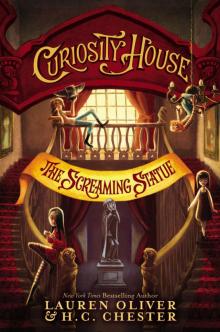 The Screaming Statue
The Screaming Statue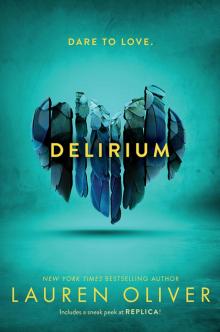 Delirium
Delirium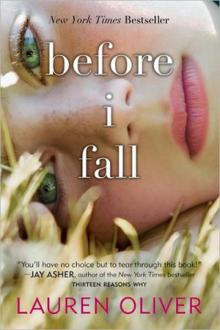 Before I Fall
Before I Fall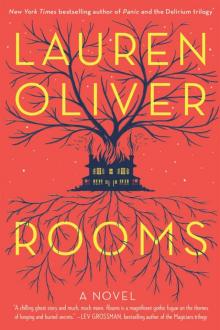 Rooms
Rooms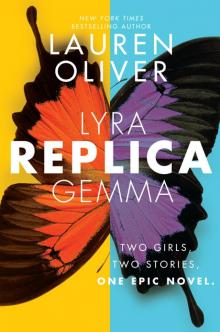 Replica
Replica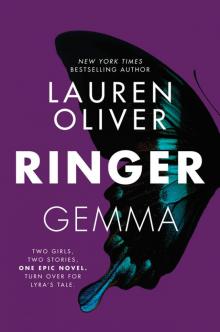 Ringer
Ringer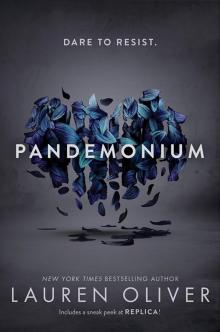 Pandemonium
Pandemonium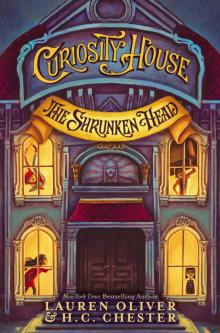 The Shrunken Head
The Shrunken Head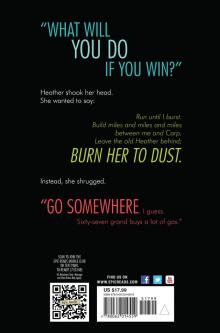 Panic
Panic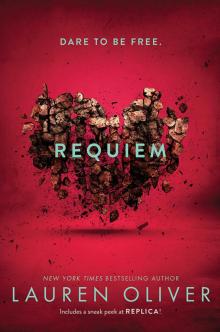 Requiem
Requiem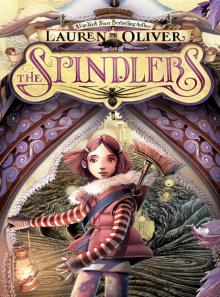 The Spindlers
The Spindlers Annabel
Annabel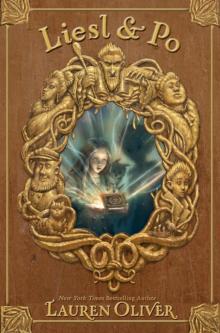 Liesl & Po
Liesl & Po Raven
Raven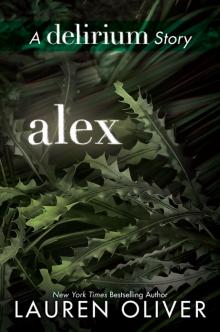 Alex
Alex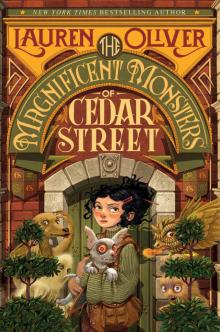 The Magnificent Monsters of Cedar Street
The Magnificent Monsters of Cedar Street Vanishing Girls
Vanishing Girls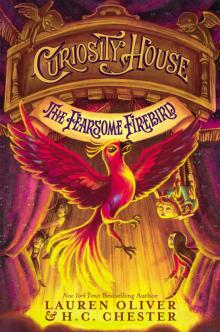 The Fearsome Firebird
The Fearsome Firebird Raven: A Delirium Short Story
Raven: A Delirium Short Story Annabel: A Delirium Short Story
Annabel: A Delirium Short Story Hana: A Delirium Short Story
Hana: A Delirium Short Story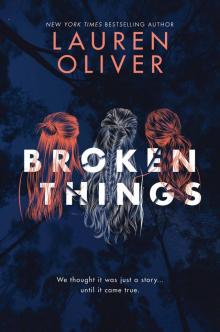 Broken Things
Broken Things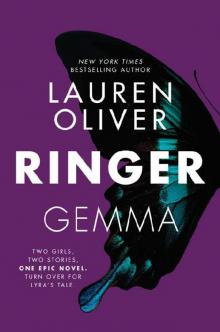 Ringer (Replica)
Ringer (Replica) Alex (delirium)
Alex (delirium)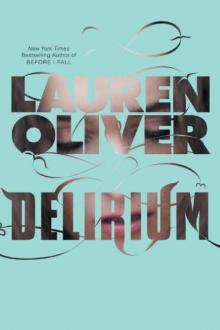 Delirium dt-1
Delirium dt-1